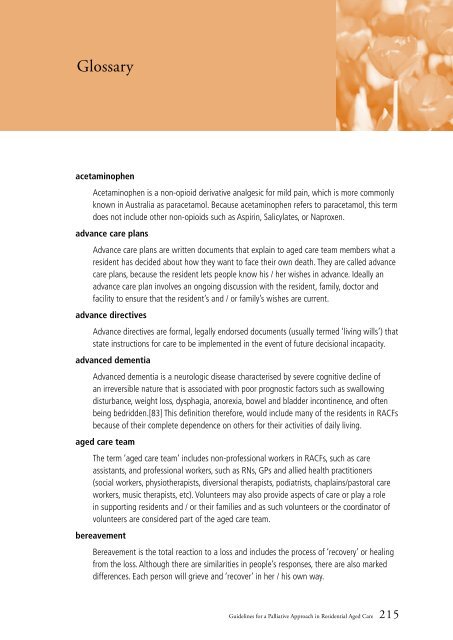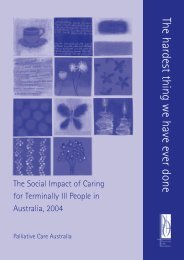Guidelines for a Palliative Approach in Residential Aged Care
Guidelines for a Palliative Approach in Residential Aged Care
Guidelines for a Palliative Approach in Residential Aged Care
Create successful ePaper yourself
Turn your PDF publications into a flip-book with our unique Google optimized e-Paper software.
Glossary<br />
acetam<strong>in</strong>ophen<br />
Acetam<strong>in</strong>ophen is a non-opioid derivative analgesic <strong>for</strong> mild pa<strong>in</strong>, which is more commonly<br />
known <strong>in</strong> Australia as paracetamol. Because acetam<strong>in</strong>ophen refers to paracetamol, this term<br />
does not <strong>in</strong>clude other non-opioids such as Aspir<strong>in</strong>, Salicylates, or Naproxen.<br />
advance care plans<br />
Advance care plans are written documents that expla<strong>in</strong> to aged care team members what a<br />
resident has decided about how they want to face their own death. They are called advance<br />
care plans, because the resident lets people know his / her wishes <strong>in</strong> advance. Ideally an<br />
advance care plan <strong>in</strong>volves an ongo<strong>in</strong>g discussion with the resident, family, doctor and<br />
facility to ensure that the resident’s and / or family’s wishes are current.<br />
advance directives<br />
Advance directives are <strong>for</strong>mal, legally endorsed documents (usually termed ‘liv<strong>in</strong>g wills’) that<br />
state <strong>in</strong>structions <strong>for</strong> care to be implemented <strong>in</strong> the event of future decisional <strong>in</strong>capacity.<br />
advanced dementia<br />
Advanced dementia is a neurologic disease characterised by severe cognitive decl<strong>in</strong>e of<br />
an irreversible nature that is associated with poor prognostic factors such as swallow<strong>in</strong>g<br />
disturbance, weight loss, dysphagia, anorexia, bowel and bladder <strong>in</strong>cont<strong>in</strong>ence, and often<br />
be<strong>in</strong>g bedridden.[83] This def<strong>in</strong>ition there<strong>for</strong>e, would <strong>in</strong>clude many of the residents <strong>in</strong> RACFs<br />
because of their complete dependence on others <strong>for</strong> their activities of daily liv<strong>in</strong>g.<br />
aged care team<br />
The term ‘aged care team’ <strong>in</strong>cludes non-professional workers <strong>in</strong> RACFs, such as care<br />
assistants, and professional workers, such as RNs, GPs and allied health practitioners<br />
(social workers, physiotherapists, diversional therapists, podiatrists, chapla<strong>in</strong>s/pastoral care<br />
workers, music therapists, etc). Volunteers may also provide aspects of care or play a role<br />
<strong>in</strong> support<strong>in</strong>g residents and / or their families and as such volunteers or the coord<strong>in</strong>ator of<br />
volunteers are considered part of the aged care team.<br />
bereavement<br />
Bereavement is the total reaction to a loss and <strong>in</strong>cludes the process of ‘recovery’ or heal<strong>in</strong>g<br />
from the loss. Although there are similarities <strong>in</strong> people’s responses, there are also marked<br />
differences. Each person will grieve and ‘recover’ <strong>in</strong> her / his own way.<br />
<strong>Guidel<strong>in</strong>es</strong> <strong>for</strong> a <strong>Palliative</strong> <strong>Approach</strong> <strong>in</strong> <strong>Residential</strong> <strong>Aged</strong> <strong>Care</strong> 215
















